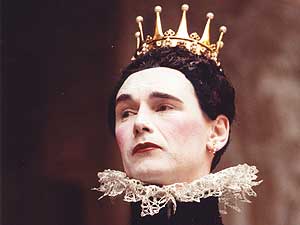|
Audio
Photos
Resources
Your Voice
|
Guthrie hosts an 'original' Twelfth Night
November 5, 2003
This week the Globe Theatre of London is in Minneapolis to perform William Shakespeare's Twelfth Night. It's what's called an "original practices" production. The show is done much as it would have been done 400 years ago, when the Bard himself was watching from the wings. The Globe's artistic director says they've learned many things about Shakespeare's work, and his world, through doing the show.
Minneapolis, Minn. — Mark Rylance sits in a Guthrie Theater office to explain "original practices." The idea came up after a multi-million dollar replica of the Globe was built in London. Rylance was chosen to lead the resident company.
One day while chatting with the company designer, he wondered what it would be like to do a show under the same conditions as Elizabethan actors. They decided to give it a try. He says the Globe actors don't go whole hog -- for example, they don't use Elizabethan pronunciation. But they do, as he puts it, explore how the plays evolve when presented with simple oak sets, and unchanging lighting.
"They did not use lights to set the scene or change the mood, or punctuate with rhythm or whatever. They really used music in the way that now modern theater uses lights. The music does all those things," says Rylance.
 | |||
The company uses handstitched costumes, made from wool and cotton, the materials of the times. There are no zippers or velcro. There is no amplification. There are some people absent, too.
"What we are exploring is the original practice of a single gender, in this case an all-male single gender," says Rylance. "Last summer in England we did an all-female single gender for the first time, but in Shakespeare's day women were not allowed to play on the stage, so it was just men."
Mark Rylance plays the Countess Olivia in this production of Twelfth Night. He says there would have been some discomfort for an actor to play the role four centuries ago, but for what is now a surprising reason.
"It was probably more outrageous that a common man like you or I was playing an aristocrat, than if a common man like you and I was playing a woman," he says.
The overall effect, Rylance says, is a shift in emphasis in the play. There are little changes that can make a big difference.
"In Shakespeare's day, people spoke about going to 'hear a play.' No one ever spoke about going to 'see' Julius Caesar, they were going to 'hear' Julius Caesar. It was a form that was aimed primarily at the ear," says Rylance. "That is not to say that there wasn't beautiful clothing, and beautiful gestures, and all kinds of things like that, but the main thing was what you were hearing."
|
I am not against intellectual appreciation. ... But I am against the feeling that it is the only way to enjoy Shakespeare. I would say that actually enjoying Shakespeare is more important than understanding Shakespeare.
- Mark Rylance |
Apparently folks even listened differently. Rylance points out that the only place for an Elizabethan to have heard something as loud as, say, a garbage truck, was on a battlefield. He says people's hearing was much more finely tuned, and as a result the actors had to "speak beautifully."
"To speak with force, fluency and appropriateness, to move the emotions and affect the mind," he says.
Rylance says his company has found that this is somewhat of a lost art, but they are working on getting it right. He says there is an important visceral element to playing Shakespeare's work. He says the work was designed to be understood by the ordinary person in the street.
"I am not against intellectual appreciation. Thank God, there's a lot there, a lot of wonderful stuff that goes on there. But I am against the feeling that it is the only way to enjoy Shakespeare," says Rylance. "I would say that actually enjoying Shakespeare is more important than understanding Shakespeare."
There is another big difference in from Shakespeare's day. Audiences came armed with rotten fruit and vegetables just in case they didn't like a play. Mark Rylance says his company encourages people to get involved in the play, but not too much.
"The problem we had at the beginning with the Globe was we had people throwing things just to be like Tudor folk, and that of course was not involvement," says Rylance. "That was more of a mockery and a certain need to debunk Shakespeare, which is maybe a good thing. Shakespeare always needs bringing down. He's on far too high a pedestal I'm sure for his own taste, as well as mine."
So the company tried to discourage the practice. Then it did a production of Henry the Fifth, and the director of the show became aware someone was throwing things at the actors playing French soldiers.
"And he came upon, not a young kind of mob, throwing things and laughing, but a middle-aged woman -- her legs widely spread on the floor, so she had a good stance, legs spread with a basket of vegetables -- hurling these things with such passion at the French that he thought, 'This woman is going through something quite serious. In fact I might get a punch in the nose if I try to stop her.'"
Mark Rylance is confident that Twelfth Night will not produce such passion. Although he is always hopeful the show may produce other projectiles.
"Unless people want to throw money. Actors will always welcome money being thrown at us," Rylance says.
The Globe Theatre's production of Twelfth Night runs through Sunday at the Guthrie Theater in Minneapolis.
|
News Headlines
|
Related Subjects
|

